What I learned from my mother
My mother was a really, really smart student. When it came time to decide what to do for her university degree, she was given two options (like every smart student in India in the 1960s): engineering or medicine. No women in engineering school, but medical schools in India had almost equal numbers of male and female students in the 1960s, so Mom went to med school. That's where she met my dad.
They got married and immigrated to England, and then to Edmonton and the cold of the Canadian North. They chose Edmonton because my dad's sister lived in Montreal, and my dad wasn't familiar enough with Canadian geography not to realize the two places were not that close together. They bought an orange VW and my mom bought a hot pink trench coat.They had done residencies in India, and in England, but the Canadian medical board made them do a third residency in Canada, just in case they weren't trained well enough. So they did, at the Royal Alec hospital. My mom had me six weeks before her board exams. She passed.
We moved even farther north, to Flin Flon, Manitoba -- the only North American city named after a character in a science fiction novel (Flintibatty Flonitan, who was commemorated at the town limits by a thirty foot statue of Elmer Fudd.) Then, when I was six, we moved to Lethbridge, Alberta, because my mom finally got fed up with the cold.
Lethbridge was not exactly balmy, but it was closer to the US border than the Arctic Circle, and it had the chinooks -- warm winds that blew through and could raise the temperature from -20 C to +20 C in the matter of hours -- so that was something. The trees grew at an angle, and as kids it wasn't unusual to be blown over by the gusts, but we thought it was hilarious. Of course, the winds are often blamed for the higher than expected suicide and mental illness rates in the region. But that's not the story here.
The move to Lethbridge was a hard one for my parents; I don't remember what I thought about it at the time. Moving to Flin Flon was easier: it was a coal-mining town in the far north, and so everyone was just so grateful to have doctors there that they didn't mind if the doctors were East Indian. In Lethbridge, my parents arrived at the hospital on their first day to find pinned on the bulletin board in the doctor's lounge a drawing by one of the internists showing Mom and Dad as African medicine men, with bones through noses and all the expected accouterments.
Just in case my dad was not sufficiently trained after three different residencies in three different continents, including one in the same province, the doctors in Lethbridge asked him to complete another six-month "refresher" residency in Edmonton. My mom was left on her own with two kids, ages 4 and 6; the other doctors who practiced anesthesia (without being trained anaesthaesiologists) put my highly-qualified mom through her own hazing period of on-call shifts multiple times a week. She struggled to find babysitters who could come in overnight when she was called out to take emergency cases; my sister and I would hide in our rooms, trying to avoid these women with their cigarettes and their boyfriends, making out on the living room couch.
I remember going to Sears with Mom so she could return a jacket that didn't fit my dad; I might have been six. The salesman in the men's section was younger than her, and very tall compared to Mom's 5'2". He grabbed the jacket and grumbled under his breath, and I remember being scared at how he was acting. My mother asked if he was trying to say something to her, and he said "You people always come in here returning things. Why do you even bother shopping." My mom turned red -- furious, ashamed. I remember that look. She said, tears in her voice, "Give me back the pants. I won't return them, then. Give them to me." The salesman realized he'd crossed the line: "No, ma'am -- you want to return them I'll take them back." "No," my mom said, her voice rising, "I don't want any favors." She reached for the jacket and her credit card; he held them both up high over his head, and I watched my mom stretch her arms and jump to reach for them. I was wailing, seeing my mom's humiliation.
He finally gave them back. My mom was crying. She walked us right over to the customer service office and complained. The store manager took us back to the men's department and fired the salesman in front of us.
A few weeks after I started grade one at the public school that still bussed all children home for lunch and back to school every single day -- so strong was the expectation that mothers would be home, waiting to feed their kids at noon -- I was brought in to see the school psychologist. "Dear, what does your mother do?" "My mommy is a doctor." "No, dear, your mommy is a nurse." "No, my mommy is a doctor." "No, dear, your mommy is a nurse." This went on for quite some time.
My mother was brought in to discuss with the school psychologist my propensity to lie. "What is she lying about?" Mom asked.
I did not envy the school psychologist at that moment.
My mother switched me to a Catholic public school, because they allowed students to bring their lunch and stay at school for the whole school day. We were latch-key kids. If I ever let my own daughter come home alone and stay in the house by herself now, my mother would kill me. But times were different, and in this town there really wasn't much choice. There were no afterschool programs, there were hardly any babysitters. Mothers didn't work, for the most part.
Mom would start in the O.R. at 7.30 am and come home at the end of the day and cook dinner. Cooking was not something she loved to do back then; it was a chore that had to get done as quickly as possible so that she could get the thousands of other things that she had to do done. But she was a very good cook, even despite that impatience. She taught me to make chicken curry, rice, and a vegetable in 30 minutes flat. Here's how.
Mom's Chicken Curry, Rice, and a Vegetable in 30 Minutes or So for a Family of Four
1. Put 1.5 c rice in a saucepan. Rinse with cold water; swish the rice around with your hands till the water is cloudy, drain, and rinse again. Drain, add 3 c fresh water, a good pinch of salt, and put on the stove on high heat. (Note: I now use a rice cooker for this step. That way I can set it and ignore till done; down side is that you do need to set it up earlier than 30 minutes in advance.)
2. While rice is coming to a boil, chop 1 large onion, smash 2 garlic cloves, and cut off 2 coins of ginger. If you'd like, chop a green chili.
3. Heat 2 TB canola oil in a deep skillet. Add the onion/garlic/ginger/chili, and sauté until the onion is softened and turning golden.
4. The rice will have come to a boil by now. Take a fork, stir the pot to make sure nothing's stuck to the bottom, turn the heat to low and cover tightly.
5. To the onions etc., add the chicken (either 4 skinless chicken thighs and drumsticks, or one small chicken cut into 10 pieces and skin removed). Sauté until the chicken has lost its raw color. At this point, add 1 level TB coriander powder, 2 tsp cumin powder, 1/2 tsp turmeric powder, and 1 TB sweet paprika. Sauté for a couple of minutes.
6. Add 1 cup chopped tomatoes (canned are fine) and 1/2 tsp salt, turn heat to low, and cover the pan. Let simmer.
7. Shred half a head of cabbage (coarsely, with your knife). Cut 1" of ginger into matchsticks, and chop one green chili. In another pot, heat 2 TB canola oil along with 1 tsp black mustard seeds. When the mustard seeds start to sputter and pop, throw in the ginger, green chili, and about 10 curry leaves. A minute later, add the cabbage, 1/2 tsp salt, 1 tsp sugar; sauté for a minute or so. Add 1/4 c water, turn heat to medium, and cook, stirring occasionally.
8. Check the rice; when it looks like all the liquid has been absorbed, turn off the heat. Leave covered till you're ready to eat.
9. Check the chicken. There should be some sauce in the pan now that the chicken has released its juices; if you need more, add a bit of water. Adjust the salt.
10. Check the cabbage. Make sure it doesn't burn. My mom always burned the cabbage.
When everything's cooked, plop the pots on the table (make sure you put them on the "wooden things," which was what Mom always called trivets), and dig in.
They got married and immigrated to England, and then to Edmonton and the cold of the Canadian North. They chose Edmonton because my dad's sister lived in Montreal, and my dad wasn't familiar enough with Canadian geography not to realize the two places were not that close together. They bought an orange VW and my mom bought a hot pink trench coat.They had done residencies in India, and in England, but the Canadian medical board made them do a third residency in Canada, just in case they weren't trained well enough. So they did, at the Royal Alec hospital. My mom had me six weeks before her board exams. She passed.
We moved even farther north, to Flin Flon, Manitoba -- the only North American city named after a character in a science fiction novel (Flintibatty Flonitan, who was commemorated at the town limits by a thirty foot statue of Elmer Fudd.) Then, when I was six, we moved to Lethbridge, Alberta, because my mom finally got fed up with the cold.
Lethbridge was not exactly balmy, but it was closer to the US border than the Arctic Circle, and it had the chinooks -- warm winds that blew through and could raise the temperature from -20 C to +20 C in the matter of hours -- so that was something. The trees grew at an angle, and as kids it wasn't unusual to be blown over by the gusts, but we thought it was hilarious. Of course, the winds are often blamed for the higher than expected suicide and mental illness rates in the region. But that's not the story here.
The move to Lethbridge was a hard one for my parents; I don't remember what I thought about it at the time. Moving to Flin Flon was easier: it was a coal-mining town in the far north, and so everyone was just so grateful to have doctors there that they didn't mind if the doctors were East Indian. In Lethbridge, my parents arrived at the hospital on their first day to find pinned on the bulletin board in the doctor's lounge a drawing by one of the internists showing Mom and Dad as African medicine men, with bones through noses and all the expected accouterments.
Just in case my dad was not sufficiently trained after three different residencies in three different continents, including one in the same province, the doctors in Lethbridge asked him to complete another six-month "refresher" residency in Edmonton. My mom was left on her own with two kids, ages 4 and 6; the other doctors who practiced anesthesia (without being trained anaesthaesiologists) put my highly-qualified mom through her own hazing period of on-call shifts multiple times a week. She struggled to find babysitters who could come in overnight when she was called out to take emergency cases; my sister and I would hide in our rooms, trying to avoid these women with their cigarettes and their boyfriends, making out on the living room couch.
I remember going to Sears with Mom so she could return a jacket that didn't fit my dad; I might have been six. The salesman in the men's section was younger than her, and very tall compared to Mom's 5'2". He grabbed the jacket and grumbled under his breath, and I remember being scared at how he was acting. My mother asked if he was trying to say something to her, and he said "You people always come in here returning things. Why do you even bother shopping." My mom turned red -- furious, ashamed. I remember that look. She said, tears in her voice, "Give me back the pants. I won't return them, then. Give them to me." The salesman realized he'd crossed the line: "No, ma'am -- you want to return them I'll take them back." "No," my mom said, her voice rising, "I don't want any favors." She reached for the jacket and her credit card; he held them both up high over his head, and I watched my mom stretch her arms and jump to reach for them. I was wailing, seeing my mom's humiliation.
He finally gave them back. My mom was crying. She walked us right over to the customer service office and complained. The store manager took us back to the men's department and fired the salesman in front of us.
A few weeks after I started grade one at the public school that still bussed all children home for lunch and back to school every single day -- so strong was the expectation that mothers would be home, waiting to feed their kids at noon -- I was brought in to see the school psychologist. "Dear, what does your mother do?" "My mommy is a doctor." "No, dear, your mommy is a nurse." "No, my mommy is a doctor." "No, dear, your mommy is a nurse." This went on for quite some time.
My mother was brought in to discuss with the school psychologist my propensity to lie. "What is she lying about?" Mom asked.
I did not envy the school psychologist at that moment.
My mother switched me to a Catholic public school, because they allowed students to bring their lunch and stay at school for the whole school day. We were latch-key kids. If I ever let my own daughter come home alone and stay in the house by herself now, my mother would kill me. But times were different, and in this town there really wasn't much choice. There were no afterschool programs, there were hardly any babysitters. Mothers didn't work, for the most part.
Mom would start in the O.R. at 7.30 am and come home at the end of the day and cook dinner. Cooking was not something she loved to do back then; it was a chore that had to get done as quickly as possible so that she could get the thousands of other things that she had to do done. But she was a very good cook, even despite that impatience. She taught me to make chicken curry, rice, and a vegetable in 30 minutes flat. Here's how.
Mom's Chicken Curry, Rice, and a Vegetable in 30 Minutes or So for a Family of Four
1. Put 1.5 c rice in a saucepan. Rinse with cold water; swish the rice around with your hands till the water is cloudy, drain, and rinse again. Drain, add 3 c fresh water, a good pinch of salt, and put on the stove on high heat. (Note: I now use a rice cooker for this step. That way I can set it and ignore till done; down side is that you do need to set it up earlier than 30 minutes in advance.)
2. While rice is coming to a boil, chop 1 large onion, smash 2 garlic cloves, and cut off 2 coins of ginger. If you'd like, chop a green chili.
3. Heat 2 TB canola oil in a deep skillet. Add the onion/garlic/ginger/chili, and sauté until the onion is softened and turning golden.
4. The rice will have come to a boil by now. Take a fork, stir the pot to make sure nothing's stuck to the bottom, turn the heat to low and cover tightly.
5. To the onions etc., add the chicken (either 4 skinless chicken thighs and drumsticks, or one small chicken cut into 10 pieces and skin removed). Sauté until the chicken has lost its raw color. At this point, add 1 level TB coriander powder, 2 tsp cumin powder, 1/2 tsp turmeric powder, and 1 TB sweet paprika. Sauté for a couple of minutes.
6. Add 1 cup chopped tomatoes (canned are fine) and 1/2 tsp salt, turn heat to low, and cover the pan. Let simmer.
7. Shred half a head of cabbage (coarsely, with your knife). Cut 1" of ginger into matchsticks, and chop one green chili. In another pot, heat 2 TB canola oil along with 1 tsp black mustard seeds. When the mustard seeds start to sputter and pop, throw in the ginger, green chili, and about 10 curry leaves. A minute later, add the cabbage, 1/2 tsp salt, 1 tsp sugar; sauté for a minute or so. Add 1/4 c water, turn heat to medium, and cook, stirring occasionally.
8. Check the rice; when it looks like all the liquid has been absorbed, turn off the heat. Leave covered till you're ready to eat.
9. Check the chicken. There should be some sauce in the pan now that the chicken has released its juices; if you need more, add a bit of water. Adjust the salt.
When everything's cooked, plop the pots on the table (make sure you put them on the "wooden things," which was what Mom always called trivets), and dig in.

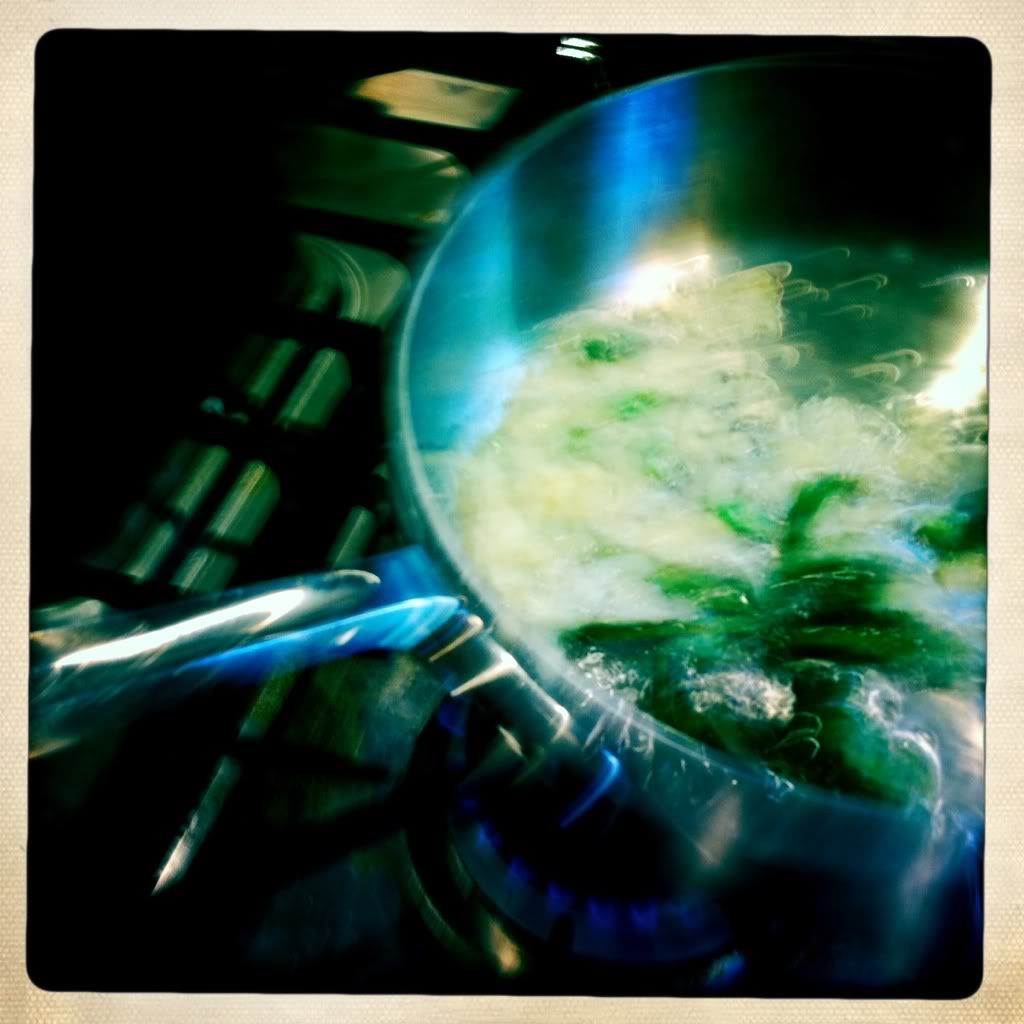
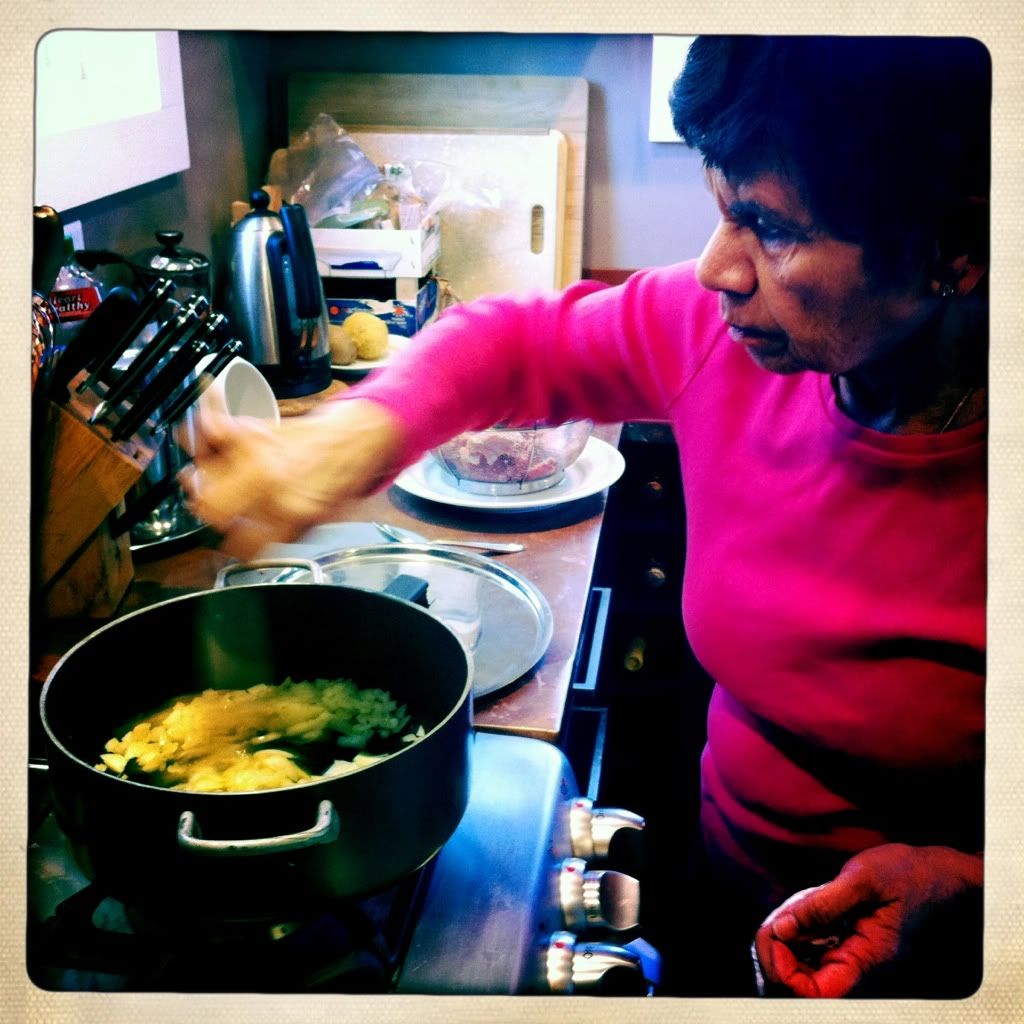
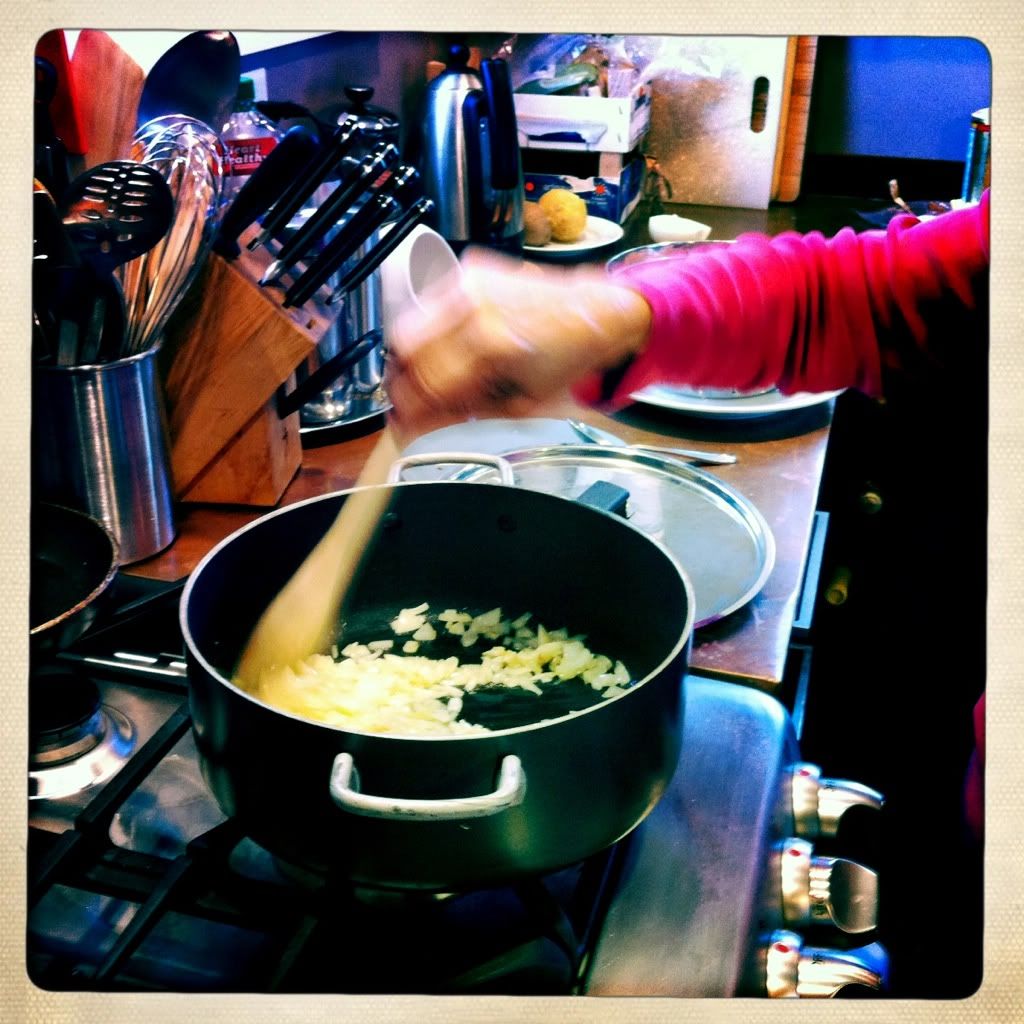
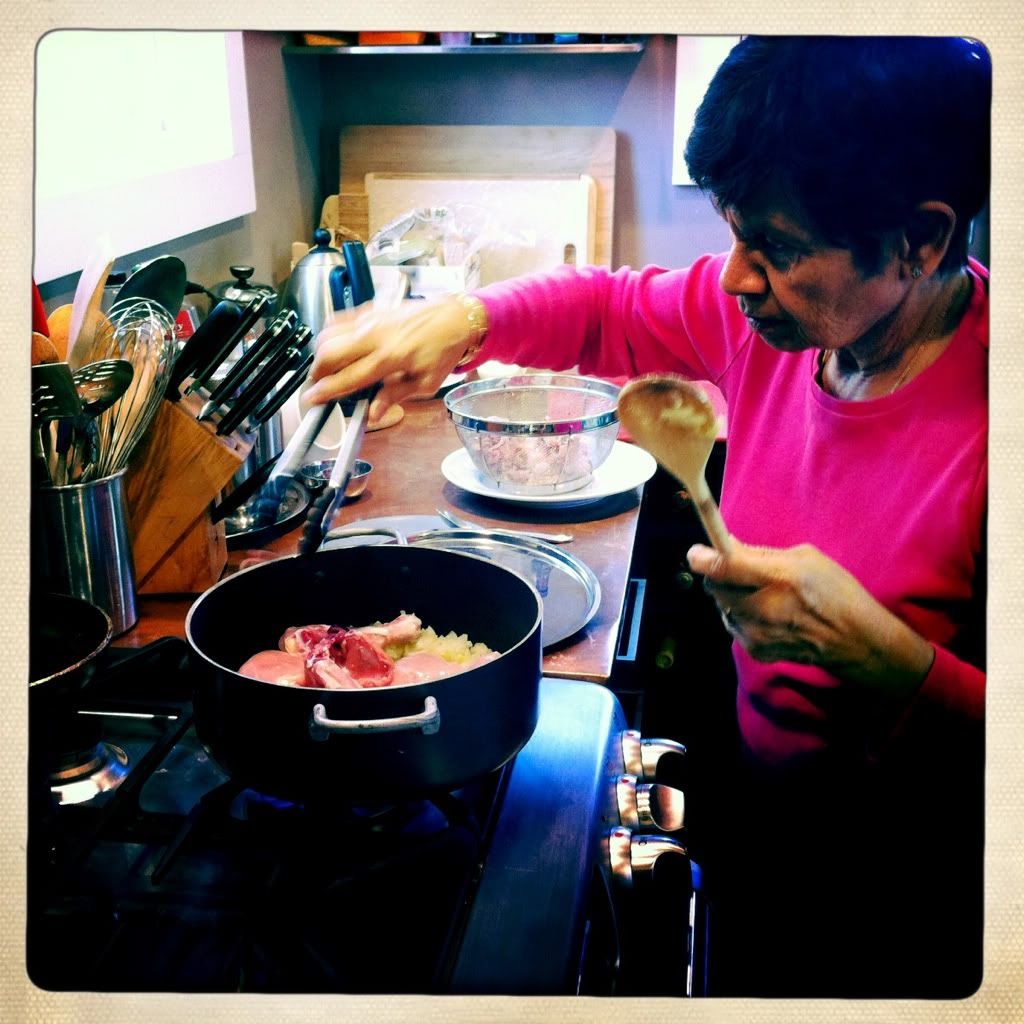
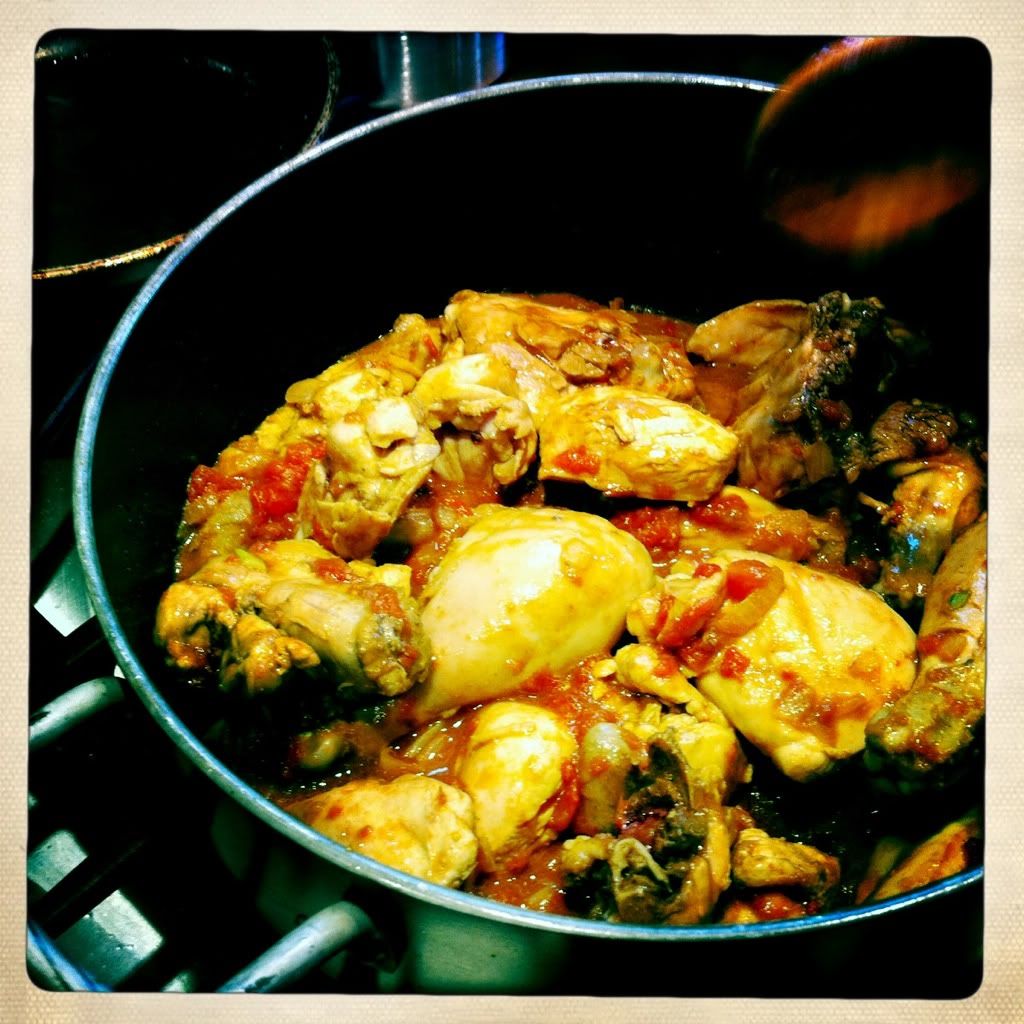
Comments
As I thought about this afterwards, I realized it must have been at least two cans of water--how else would there be enough for the rice? My hesitation on that small point of fact about a dish I must have assembled hundreds of times during those latch key years makes me realize how much time has passed. I can still taste the flavor in my mouth though as if I ate it for dinner yesterday. Proust was right when he figured out that different senses have different memory horizons...
I remember you from when I was a child and my mother, Chris, had a daycare in our home just a few blocks from the Royal Alexandra Hospital in Edmonton where your young parents worked as anesthesiologists. I remember your mom and dad as I would always come to the front door when you came and went, standing back, quietly observing. They always had a lot of questions about how you had been that day, and it was obvious they loved you so very much.
To be forthright, I feel the need to set the record straight: my mom never smoked, but my dad did, although he was away at work every day. I have always detested cigarette smoke myself, so I do understand the sentiment; however, no boyfriends or making out on the couch by anyone in the house, not even my teenage siblings. (lol) Our home was not that kind of place, just a traditional, respectable Canadian home with four kids and a little Chihuahua named Trixie, but I concede as a writer you do have creative license; I don't begrudge you that.
You were first brought to us when you were three months old. I was the youngest of my siblings at probably 10 years old, and I was absolutely smitten with you, your big, beautiful, brown eyes and your adorable little smile. I always wanted to be the one who fed you your bottle or baby food and would sit, talk and play with you while you bounced in the little Bouncinette. And I remember being so sad when your parents stopped bringing you to our house. I recall Mom telling me your family had gone to Flin Flon.
Over the years I often wondered what became of you, and tonight I Googled your name and found this blog on your website. A lot of years have gone by, my own two daughters all grown up now, both my parents have passed, but I have to admit, you still look like that tiny little girl I adored.
Keep well, Aruna. You touched my life. Thanks for the memories!
Bonnie Walke (nee: Polak)